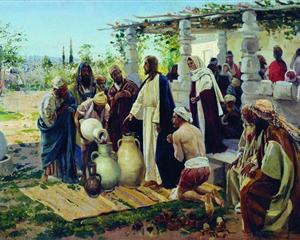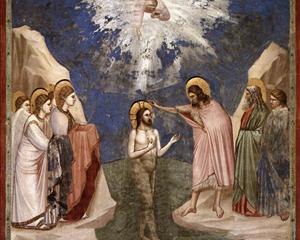This guest post was written by Greg Hoerter, Manager of Strategic Partnerships for Verbum Catholic Products.
Meditating on the Wedding at Cana always gives me a better sense of Mary’s role as the Queen Mother of the Messiah. In John 2:1-11, we see a very unusual wedding story.
First, the Bride and Groom are never named. Many church fathers and theologians speculate that Jesus, who is called the Bridegroom in the next chapter (Jn 3:29) and elsewhere in scripture, is meant to be the Groom and Mary the Bride, as she is the New Eve.

Mary takes a very prominent role in the story as she is listed first among the guests: “1 On the third day there was a marriage at Cana in Galilee, and the mother of Jesus was there; 2 Jesus also was invited to the marriage, with his disciples.” (John 2:1–2, RSVCE)
As the wine runs out, Mary immediately acts and intercedes for the hosts. As the Queen Mother, this is her role as the intercessor, as we see in the Old Testament. In the Davidic Kingdom, the Queen was the Mother of the King since he often had more than one wife. In 1 Kings we read: “So Bathsheba [Solomon’s mother] went to King Solomon, to speak to him on behalf of Adonijah. And the king rose to meet her, and bowed down to her; then he sat on his throne, and had a seat brought for the king’s mother; and she sat on his right. Then she said, “I have one small request to make of you; do not refuse me.” And the king said to her, “Make your request, my mother; for I will not refuse you.”” (1 Kings 2:19–20, RSVCE)
The role of the Queen Mother (Hebrew: Gebirah) is to hear the requests of the people and to take them to the King. Just as Bathsheba did in the Old Testament, Mary did at Cana in the New Testament and even still today for us. She intercedes and takes our prayers and requests to Her Son the King of Kings. And just as King Solomon said 3,000 years ago, Jesus says to his Mother today: “Make your request, my mother; for I will not refuse you”.
But our requests are not always answered. In the above example in 1 Kings, Adonijah, the half-brother of Solomon, requested something that would have cost Solomon his kingdom. Therefore, Solomon could not honor the request, as it was against his Father David’s will, and God’s will. In the same way, we cannot ask for something that goes against God’s will and our ultimate good and expect it to be granted. King Solomon had a double portion of Wisdom granted to him, but our Lord knows our minds and our hearts, and what’s best for us, even better than we do.
So after we make our petitions, Mary’s words to us are still: “Do whatever he tells you”.




